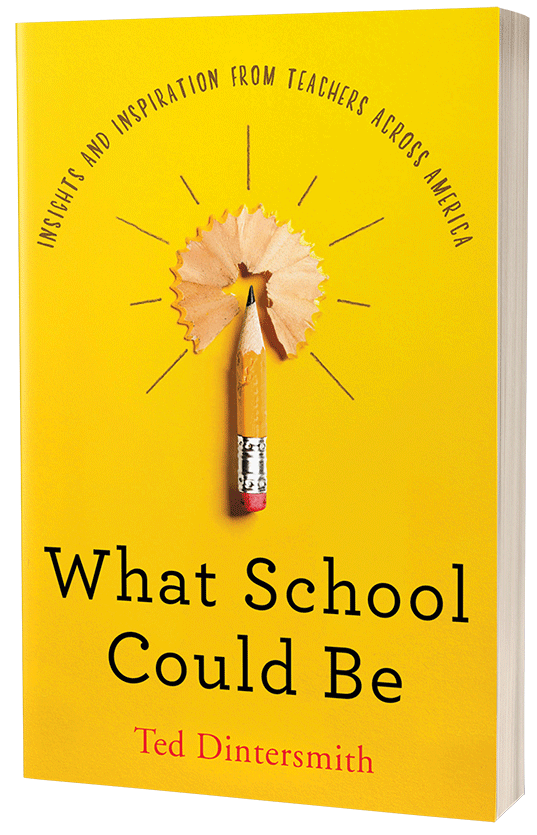“What Schools Could Be” is an optimistic read that inspires to bring real-life value back to a high school education
I love learning. I know, I know, that seems cliche, especially since I’m a teacher, but it’s true. I really enjoy learning new things about a wide variety of topics. I’ve been this way for as long as I can remember, probably why I was often called a “know-it-all” at various points growing up — because I really did want to “know it all”.
School was easy for me — Algebra II and Anatomy were the first classes that caused me any trouble, read lots of tears, but I still made it through those with good grades. Standardized tests were also easy for me, and I tended to do pretty well on them. All in all, I could probably be a poster child for the traditional model of education.
Spoiler alert — I’m not. At least, not anymore. A few years ago, I saw a social media post circulating about how schools were awful for not teaching any life skills — cooking, sewing, changing a tire, and doing your taxes. My gut reaction was defensive — we teachers have so many other things to teach, why aren’t the parents teaching this?! But the post made me uncomfortable, a feeling that stayed with me.
Like any good Norwegian, I don’t like change or conflict, but I’m one hundred percent convinced that change, and maybe even conflict, are what need to happen for schools to be better. I recently read the book “What Schools Could Be” by Ted Dintersmith, and it re-lit my passion for education that had been partially snuffed out by all the petty things a teacher deals with, the obsession with data that has taken over schools. Dintersmith’s book is an exploration of innovation happening in schools across the United States, and it’s inspiring.
Dintersmith uses the phrase “do better things” repeatedly throughout his book, and this idea has stayed with me. Lots of times, schools are so proud of themselves for coming up with better ways to do things, but it doesn’t affect much positive change. Dintersmith explains that it is because they are still doing the same things, albeit slightly better, but that those ‘things’ don’t have a meaningful application. Why do things better when we could just do better things?
The book focuses on the idea of PEAK principles, an acronym for purpose, essentials, agency, and knowledge. The argument that students will thrive in environments where they are able to participate in improving their world by attacking challenges they recognize as important, and can acquire skill sets and mind-sets for an innovative future. Students should motivate their own learning and when what they are doing is authentic, they are more likely to retain the deeper knowledge they’ve gained through practical application.
Dintersmith also argues that high school diplomas should mean something on their own, but that they don’t, mostly because high schools have strictly become factories for funneling students to higher education. Not all students need to, nor should they, go to four year colleges. Tech/trade schools are severely underrated, but are an amazing option for so many students. Dintersmith highlights schools where high school students are solving real world problems, and getting full time career jobs straight from high school because of the meaningful experience they’ve gained in high school.
When was the last time you felt like something you did in school was truly meaningful? I think it’s important to still keep some of our guiding principles — I believe people, citizens, and members of society, should have a wide base of knowledge on many different topics — but that maybe the current factory model of education isn’t the best option anymore.
Dintersmith focuses a lot on math education in his book — not because math has changed, but because the application of it has. With the advancement of calculators and computers, he argues that students don’t need to know *how* to compute, but rather need the skills of what to compute and what formulas to enter into a calculator or computer. The idea that we are still focusing on teaching students to do math by hand that a computer can do in seconds is obsolete. We should still teach math, students should still have an understanding of the formulas, but time spent computing by hand would be better spent with real world application of math and discerning when to use which computations.
This book has opened my mind to the endless possibilities of what school could be. School could be a place where all students could realize their limitless potential. School could be a place where students could learn real-life skills and develop a portfolio of their accomplishments. School could be a place where students take ownership and instigate their own learning on topics that are interesting to them. Dintersmith’s book is meant to be read by every stakeholder in education — administrators, school board members, teachers, students, community members, employers — everyone who is invested in what our public schools are doing. 5/5 Spartan heads.
Your donation will support the student journalists of Fargo North High School. Your contribution will allow us to resume physical printing of our newspaper for students at Fargo North!





